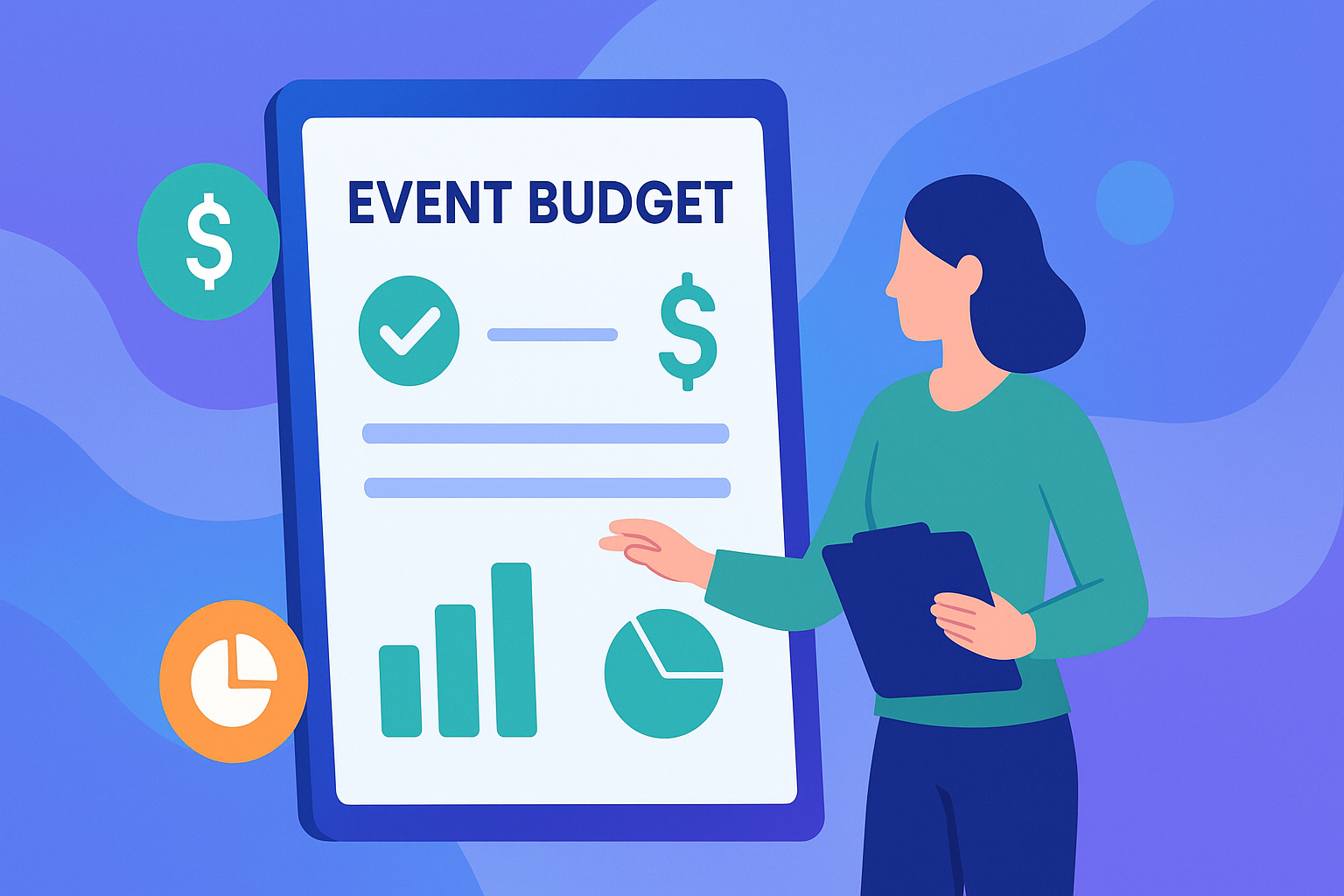Event Budgeting Tips for Event Managers: Master Event Finances

Nothing derails an event faster than a blown budget. Missed costs, overly optimistic revenue forecasts, or poor cash flow. The good news? With the right event budget template and planning tools, you can avoid surprises and manage event finances with confidence.
This article shares practical event budgeting tips for event managers, along with strategies and tools to help you build a reliable event budget template and keep your event finances on track.
Understanding the Basics of Event Budgeting
An event budget is a detailed forecast of all revenues and expenses tied to your event. Think of it as your financial roadmap, it guides you through planning, execution, and evaluation.
Why You Need an Event Budget
An effective event budget gives you:
- Financial Control: Keep spending in check and monitor costs against income.
- Decision-Making Power: Prioritize where resources have the most impact.
- Risk Management: Prepare for unexpected expenses with a safety net.
Steps to Creating an Effective Event Budget
Step 1: Identify Your Revenue Streams
List every possible source of income. Common examples include:
- Ticket sales with pricing tiers such as early bird, general admission, and VIP
- Strong sponsor management helps you design sponsorship tiers with clear value, boosting revenue and long-term partnerships.
- Vendor or exhibitor fees for booth space or participation
- Merchandise sales such as branded or event-specific items
- Grants and donations from supporting organizations
Actionable Insight: Avoid relying too heavily on one revenue stream. Balance your income mix so your event isn’t vulnerable to a single shortfall.
Step 2: Estimate Fixed and Variable Costs
Differentiate between costs that remain steady versus those that scale with attendance.
- Fixed Costs: Venue rental, insurance, permits, staging, and AV equipment
- Variable Costs: Catering, staff wages, travel reimbursements, marketing campaigns
Actionable Insight: Use last year’s numbers or industry benchmarks to estimate. If you’re new, ask venues and suppliers for quotes early to prevent surprises.
Step 3: Allocate a Contingency Fund
Plan for the unexpected. Set aside 10–20% of your total budget for emergencies, last-minute changes, or unplanned add-ons.
Example: Clara, who organizes an annual community fair, allocates 15% of her budget to cover unexpected weather-related rentals like tents and heaters.
Step 4: Use Event Management Software
Manual spreadsheets work but are error-prone and time-consuming. Event management software can streamline the process by:
- Tracking income and expenses in real time
- Generating an event budget template with smart line items
- Simplifying receipt storage and expense tracking
- Providing insights into financial trends across multiple events
This ensures you spend less time reconciling numbers and more time focusing on delivering a great event.
Step 5: Track, Review, and Adjust
An event budget isn’t “set and forget.” Update it regularly as money flows in and out.
- Review income as ticket sales and sponsorships come through.
- Re-forecast if revenue falls short.
- Reallocate funds to areas that need more support (such as a last-minute marketing push).
Actionable Insight: Schedule a short weekly finance check-in with your team to review the latest numbers. This habit prevents small issues from becoming big problems.
Common Budgeting Pitfalls (and How to Avoid Them)
Even experienced planners fall into traps. Here are three to watch for:
1. Underestimating Costs
Tiny costs like printing, parking, or volunteer meals add up fast. Capture everything in your event budget template so nothing slips through.
2. Ignoring Cash Flow
It’s not only about what you spend, but when you spend it. Track deposits, staged payments, and deadlines to avoid shortfalls.
3. Overestimating Revenue
Be conservative with revenue projections. Build your plan on minimum expected sales, not best-case scenarios. That way, if things go better than expected, you’ll have a surplus instead of a shortfall.
FAQs About Event Budgeting
What should be included in an event budget?
All sources of revenue and all expected expenses, including fixed costs, variable costs, and a contingency fund.
How often should I update my event budget?
Update your budget whenever a significant transaction occurs. Many event managers review weekly for accuracy.
What tools can help with event budgeting?
Event planning tools and event management software provide templates, automate tracking, and generate financial reports. For simple events, a spreadsheet may be enough, but for recurring or larger events, dedicated software helps you manage event finances more efficiently.
Effective event budgeting is more than crunching numbers, it’s about making strategic choices that protect your event’s financial health while enhancing the attendee experience.
By using a clear event budget template, leveraging event planning tools, and adopting event management software, you’ll manage event finances with confidence and ensure your event stays on track.
Next Step: Download our Ultimate Guide to Event Budgeting for more detailed tips and insights.
Happy planning!
